
Dannevirke, is a rural service town in the Manawatū-Whanganui region of the North Island, New Zealand. It is the main centre of the Tararua District.
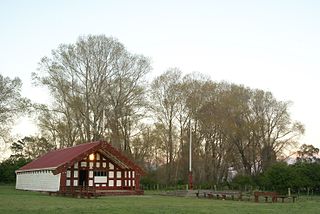
Ruatoria is a town in the Waiapu Valley of the Gisborne Region in the northeastern corner of New Zealand's North Island. The town was originally known as Cross Roads then Manutahi and was later named Ruatorea in 1913, after the Māori Master female grower Tōrea who had some of the finest storage pits in her Iwi at the time (Te-Rua-a-Tōrea). In 1925 the name was altered to "Ruatoria", although some texts retain the original spelling.

Ōtaki is a town in the Kāpiti Coast District of the North Island of New Zealand, situated half way between the capital city Wellington, 70 km (43 mi) to the southwest, and Palmerston North, 70 km (43 mi) to the northeast.
Rutherford College is a co-educational state secondary school on the Te Atatū Peninsula, Auckland, New Zealand. It is named after New Zealand-born nuclear physicist and chemist Ernest Rutherford.

Kelston Boys' High School ("KBHS") is an all-boys state secondary school in Kelston, a suburb in the Waitakere region of Auckland, New Zealand. It was created in 1963 when the roll of Kelston High School became too large for the site on the corner of Archibald and Gt North Rds. The boys moved to a new site further down Archibald Road, leaving the original site to be the home of Kelston Girls High School.

Mount Albert Grammar School, commonly known as MAGS, is a co-educational state secondary school in Mount Albert in Auckland, New Zealand. It teaches students in year levels 9 to 13. As of August 2021, Mount Albert Grammar School is the second largest school in New Zealand, behind Rangitoto College.

Avondale College is a state coeducational secondary school located in the central Auckland, New Zealand, suburb of Avondale. With a roll of 2,797 students from years 9–13, it is the third largest secondary school in New Zealand.

Henderson High School is a co-educational secondary school in the West Auckland suburb of Henderson, New Zealand, catering for students from Year 9 to Year 13. Many notable alumni attended Jubilees held in 2003 (50th) and 2013 (60th). Historically the school has always been an important part of the community and stability of leadership has ensured that it is well resourced with a wide range of facilities. Recent reviews by the Education Review Office have been positive.
Southern Cross Campus is a composite school that caters for students in Years 1-13 in the suburb of Māngere East in Auckland, New Zealand. The school has deep ties to the Mangere East community by providing education, facilities, and programmes for the wider use of the whole school. It is a Māori and Pacific Islands ethnic school, with students of European (Pākehā), Asian, and other ethnicities as a 0.5% minority.
Ngāti Raukawa is a Māori iwi with traditional bases in the Waikato, Taupō and Manawatu/Horowhenua regions of New Zealand. In 2006, 29,418 Māori registered their affiliation with Ngāti Raukawa.
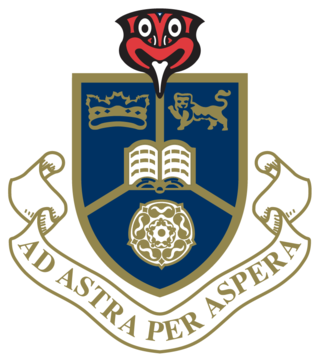
Rotorua Boys' High School (RBHS) is a state school educating boys from Year 9 to Year 13. It is situated just outside the Rotorua CBD at the intersection of Old Taupo Road and Pukuatua Street in Rotorua, New Zealand. The school is governed by an elected School Board, of which the Principal is ex officio a member under guidelines laid down by the New Zealand Ministry of Education. With Māori enrolment exceeding 75% of the school’s intake, the largest per capita in New Zealand, RBHS has been a longstanding recipient of funding from its Ngāti Whakaue endowment that assisted the construction of the school’s 104-bed hostel, and the purchase of a computer laboratory. RBHS is noted for its performance in sport, with 4 Olympians among its notable alumni, and for having won the Prime Minister of New Zealand Supreme Award for Excellence in Education and the Excellence in Leading Award, making it the top school in the country for 2019. Its current principal, Chris Grinter, is the longest serving in the school's history, and in 2022, he received a New Zealand Order of Merit for services to education and Māori.

Liston College is a school in Henderson, Auckland, New Zealand, for year seven to 13 boys and offers a Catholic education to its students. It was the second school opened by the Christian Brothers in Auckland. It was named after Archbishop Liston (1881–1976), the seventh Catholic Bishop of Auckland (1929–1970). The school was founded in 1974 to serve the Catholic families of West Auckland and to absorb the growing number of boys who travelled daily to St Peter's College in central Auckland.
De La Salle College is an integrated Catholic secondary boys' school in the south of Auckland, New Zealand. Established in 1953 by the De La Salle Brothers, it continues to educate young men in the Catholic faith and Christian values. In New Zealand there are two schools along with De La Salle College established by the Brothers in New Zealand. Francis Douglas Memorial College in New Plymouth and John Paul College in Rotorua. Students are encouraged to develop every aspect of their person and a strong emphasis is placed on excellence in academic study, cultural pride and sporting ability. Applicants need to be willing to support the Catholic character of the college.
Western Springs College/Ngā Puna o Waiōrea is a state co-educational secondary school located in Western Springs, an inner suburb of Auckland, New Zealand. Western Springs College and Ngā Puna o Waiōrea teach collaboratively on one campus. The school educates approximately 1,810 students, from Years 9 to 13. The school was originally part of Seddon Memorial Technical College, but was moved to the current Western Springs site in 1964.
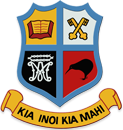
Hato Petera College was an integrated, co-educational college in Northcote Central, Auckland, New Zealand for students from Year 9 to Year 13. It existed for 90 years, opening on 3 June 1928 and closing on 31 August 2018. The school had a strong Catholic and Māori character. It was located on part of the land originally given by Sir George Grey, Governor of New Zealand, to Bishop Pompallier, the first Bishop of Auckland, in 1849 for education purposes.
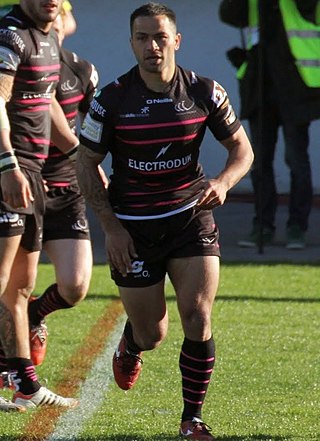
Aaron Aspin Heremaia is a New Zealand former professional rugby league footballer who last played as a goal-kicking hooker or halfback for the Widnes Vikings in the Super League.
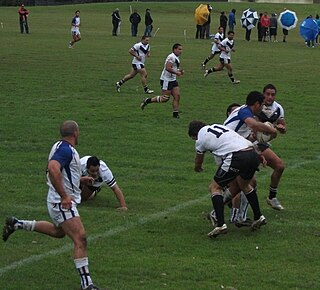
The New Zealand rugby league season 2010 was the 103rd season of rugby league that was played in New Zealand. The main feature of the year was the new National Zonal competition run by the New Zealand Rugby League. The premier teams competed for the Albert Baskerville Trophy, which was won by Auckland when they defeated Counties Manukau 14 - 6 in the Grand Final.

Sir "Sidney" Hirini Moko Haerewa Mead is a New Zealand anthropologist, historian, artist, teacher, writer and prominent Māori leader. Initially training as a teacher and artist, Mead taught in many schools in the East Coast and Bay of Plenty regions, and later served as principal of several schools. After earning his PhD in 1968, he taught anthropology in several universities abroad. He returned to New Zealand in 1977 and established the first Māori studies department in the country. Mead later became a prominent Māori advocate and leader, acting in negotiations on behalf of several tribes and sitting on numerous advisory boards. He has also written extensively on Māori culture. He is currently the chair of the council of Te Whare Wānanga o Awanuiārangi.

Kelston Girls’ College (KGC) is a single-sex girls state secondary school in Kelston, a suburb in West Auckland, New Zealand. It was created in 1963 when the roll of Kelston High School became too large for the site on the corner of Archibald and Great North Roads. The boys moved to a new site further down Archibald Road and the original site became the home of Kelston Girls' High School.

Carla Marja Olga Van Zon is a New Zealand retired artistic director. She worked on international opportunities for New Zealand artists at Creative New Zealand, before becoming artistic director of the New Zealand International Festival of the Arts in Wellington in 1996. From 2013 she was the Artistic Director of the Auckland Arts Festival, where she was responsible for commissioning works such as the opera The Bone Feeders. Van Zon has been responsible for supporting the careers of many New Zealand artists. She retired from the Auckland Arts Festival in 2017, following a diagnosis of kidney disease in 2016.
















